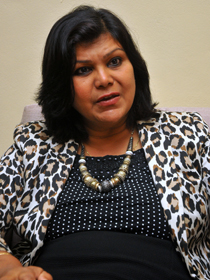Publicité
Roubina T.D. Juwaheer: “Just giving money to the poor will not help them”
Par
Partager cet article
Roubina T.D. Juwaheer: “Just giving money to the poor will not help them”


In light of the recently published university ranking, Weekly speaks to Associate Professor and 2nd Pro Vice Chancellor R. Thanika Juwaheer to ask what the university is doing wrong. We also give her the opportunity to clarify some of the allegations levelled at the lecturers and students in terms of performance and to talk about the research carried out at the university.
The university ranking, which came out recently, again shows the University of Mauritius (UOM) at the bottom of the pile even compared to African universities. Why are we doing so badly year in and year out?
I wouldn't say that we are doing badly. We are, in fact, doing quite well within Africa. So we are not so worried about the world rankings. We should remember first and foremost that the University of Mauritius was created to serve a social mandate initially. So at the end of the day, the criteria being used for ranking purposes, in terms of research, student/teacher ratio and technology etc. do not mean that we are a bad university because we don’t have a high ranking. We are not a private university. We do have our realities. Programmes are non-fee paying and we have many programmes running to serve the social needs of the country. We would like of course to have a student-lecturer ratio just like American universities, seven to one, as opposed to here where we have a ratio of 14 to one for most courses. However, given that we are still part of the African continent, we are not doing badly.
Even within Africa, we are not first, are we?
We are not first partly because of the difference between government funding and fee paying as is the case in the University of Cape Town in South Africa. Had we charged students full-fledged fees, we would have improved our labs, equipment and library. It would have been so interesting to manage.
OK, forget about countries like South Africa. You might say they have more means. Let's take Egypt for example. The country is almost torn to pieces and yet the universities are doing better than we are. Why?
When you say we, are you talking only about the University of Mauritius, or you talking about the other institutions?
The UOM but also the public tertiary education sector in general.
In this context, I have to say we have many benchmarks. We have to think over about how we can do better. But I'll insist again that we are recruiting students at the UOM with the best academic background, meaning la crème de la crème.
Are you really? Haven’t you lowered the recruitment criteria recently?
It depends. Our LLB and engineering programmes, for example, are still attracting the best students. But our social mandate is to increase access to students. We are giving education to the under-served segments of Mauritius. In spite of that, our programmes are accredited. Our engineering programmes and those from the department of accounting and chemistry are all undergoing accreditation. Our accounting programmes allow exemptions in the ACCA of up to 50%.
Talking about accounting and accreditation, Minister of Financial Services Roshi Bhadain has just announced the creation of a Financial Services Institute (FSI), will that not be in direct competition with some of your courses?
In fact, we plan to work together to develop synergies. We will see what the focus is. I don't think there will be a duplication of resources. But we have to understand what the institute is going to do. I believe it's mostly on the job and how our programmes can be linked up to the training courses of the FSI.
Isn't it your job to say ‘we don't need an institute because we don't need another training institution to produce people when there are no jobs out there’?
But the objectives of the institute are different. I'm keener from the UOM’s perspective to see what the objectives of the FSI will be. Our team from the faculty of law and management will go and try to see how we can work together.
But what is it going to add to the training that you are already doing here?
What I gather is over there, they are not going to produce graduates. It will be on-the-job training.
Aren't there enough companies doing on-the-job training for the ACCA qualifications?
We can plug in with Continuous Development Programmes. We have degree programmes and we have the expertise in accounting, management and law at the faculty. We should see about how we can have a synergy. So let's see where we can give our brains...
Your brains, incidentally, have been criticised by one of your own colleagues recently in the press. She said that you don't have the best lecturers and you don't necessarily produce the best students. What is your reaction to that?
I am tempted to say honestly that I feel that those colleagues could have been expressing their own personal opinion. I would disagree as the pro-vice chancellor that these are the opinions of the University of Mauritius.
Even if it is the personal opinion of a lecturer from within who knows the level of the lecturers, does that not worry you?
I would say no. At the university, we have different fields of expertise. I would not be bothered. I am still tempted to say that the lecturer gave her own personal opinion.
The allegation is that there is pressure on lecturers to pass students even if they don’t make the grades. Isn’t that bad for the university?
As an academic, I’ve been at the university for the past 25 years. I have to confess, I’ve headed departments, I’ve been the dean of faculty and now I am pro vice-chancellor, I have to assert that there has never been pressure to pass students. I come from a faculty where we’ve got programmes of law, which are extremely difficult, but I have never seen this pressure.
Why would a lecturer express that opinion if it was not true?
We have our communication protocol and that’s clear as academics. But, you can express your own personal opinion. I leave it to that lecturer to show whether there has been pressure because in my own many years, I have never seen that. I’ve chaired many boards of examiners as a former dean and the word ‘pressure’ never came from anyone, so I’m curious to know how such a statement was made. She will have to take her own personal responsibility.
Are you, yourself, satisfied with the level of students of the UOM?
When you talk about the level of students, which discipline are we talking about?
Are you conceding that in certain disciplines, the level of students you are churning out is inadequate?
It depends. When we talk about having a degree, I’m sure you’ll agree with me, we talk about learning, learning and relearning. So, what is important are the skills that the students are getting to make them more employable. So, I wouldn’t commit on the disciplines because at times you can be a physics graduate and then after your first degree in physics, you end up doing an MBA, you end up doing in economics or optometrics. So, I would say, I’m still learning and you’re still learning. And we are coping with lots of challenges. We do have challenges.
What are the challenges according to you?
I would have loved to see our university being financially independent.
Apart from the finances, are there other challenges? What about the research for example? Shouldn’t you be at the forefront of research, telling us what the causes of the ills of this society are?
We should be disseminating our research more.
What kind of research are you doing? We’d like you to do research in the areas that we are interested in as a society, like the causes of poverty, for example. The government is talking about this Marshall Plan as a panacea to all the ills related to poverty. “We’ll give people money and they will become richer”. Is giving the poor money, without tackling the root causes of poverty, going to serve the problem?
As researchers, we can only prove it through research. We have many researchers, seasoned academics, who have been working on the poverty issue not only nationally but even for the region. The university should have a voice. We should be present.
You should be present and you should be fearless. A minister talks about a Marshall Plan and he genuinely thinks or seems to think that by giving the poor money, they are going to become rich. And you are sitting here as academics and not saying anything.
I’m sure you must have seen our academics everywhere, sharing and discussing what could be done. So what I feel really as a researcher is yes, we should be able to forge that industry-government link to be able to respond to needs.
But are you and your colleagues in the debate about the Marshall Plan on poverty for example? Why are they not saying that giving the poor money will not work?
Giving a lot of money is not sustainable. It’s not going to solve the problem. We should be able to give the poor tools as it is done in India and Africa. Just giving them money will not help. But to teach them, giving them tools. We should be able to build a sustainable plan. Giving money is not a plan.
Coming back to the university, according to you, all is well and there is nothing to complain about, is there?
I wouldn’t come to that conclusion. I would say that we are in a developing country and we have to improve.
If you want to improve, wouldn’t a good starting point be to take onboard, positively, the things that your colleagues are saying about themselves, and about their own students?
When you say “my colleagues”, it could be just one of them who felt tempted to give her own personal opinion. I’m still tempted to come up with this conclusion. We have different opinions.
For more views and in-depth analysis of current issues, subscribe to Weekly for as little as Rs110 a month. Free delivery to your door. Contact us:touria.prayag@lexpress.mu
Publicité
Les plus récents






